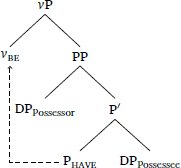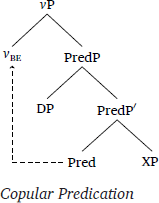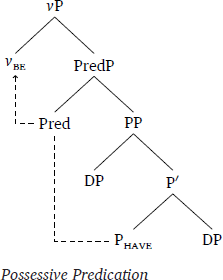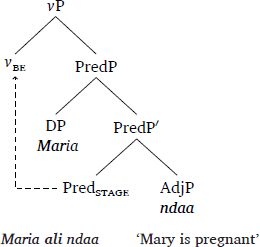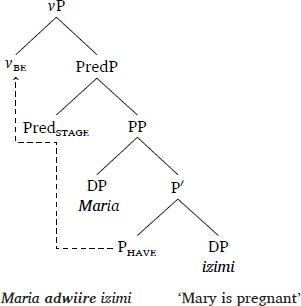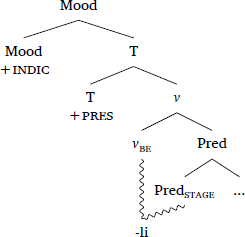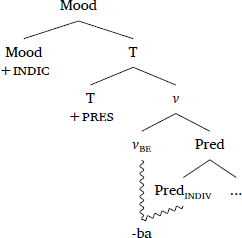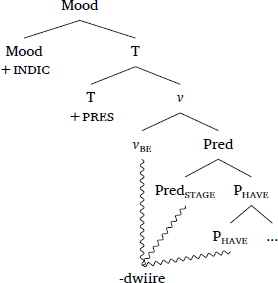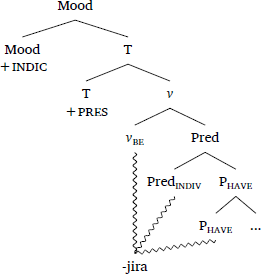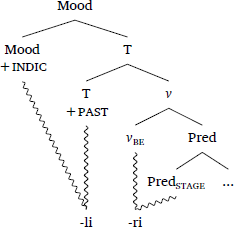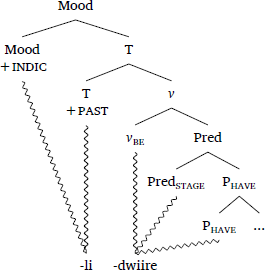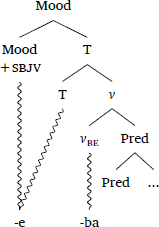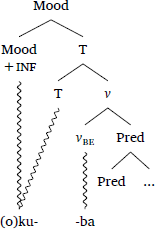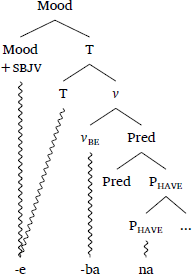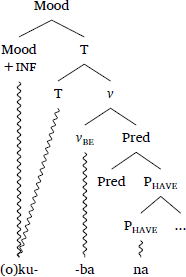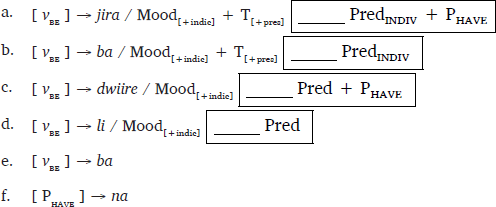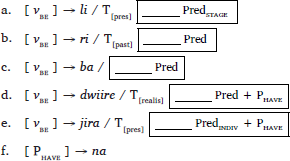1 Introduction
From a typological perspective, it is relatively common to find languages that make semantic distinctions using distinct copular verbs in non-verbal predication; there is a substantial literature suggesting that copular verbs may reflect or encode the semantic properties of the predication relation they help realize (Ramchand 1997; Greenberg 1998; Green 2000; Bochnak et al. 2011; Deo et al. 2017, a.o.). For example, many languages are reported to distinguish between stage- and individual-level prediction using different copular verbs. The Spanish copular be-verbs estar and ser exhibit distributional and interpretational differences akin to the stage-individual contrast (Carlson 1977; Diesing 1990; 1992; Kratzer 1995; Arche 2006 a.o.), with estar being preferred with properties that hold of stages (1), and ser being preferred with properties that hold of individuals (2).1
- (1)
- El
- The
- artista
- artist
- ✓está/#es
- estar/ser.pres.3sg
- presente/ausente/lejos
- present/absent/far away
- ‘The artist is present/absent/far away’ Spanish (Maienborn 2005: 173)
- (2)
- Maria
- Maria
- #está/✓es
- estar/ser.pres.3sg
- inteligente/altruista
- intelligent/altruistic
- ‘Maria is intelligent/altruistic’ Spanish (Deo et al. 2017: 8)
Another distinct line of research has investigated the distribution of copulas in ostensibly possessive constructions (Freeze 1992; Kayne 1993, a.o.). The central observation in these works is that some languages, like Russian (3), express possession via the combination of a copular be-verb and a locative or adpositional element, rather than a distinct have-verb.
- (3)
- U
- at
- menja
- 1sg.gen
- byla
- cop
- sestra
- sister.nom
- ‘I had a sister’ Russian (Freeze 1992: 577)
In yet other languages, e.g., Portuguese (4)–(5), lexical have-verbs are sometimes found to be interchangeable with be + locative/comitative ‘with’ constructions.
- (4)
- O
- the
- menino
- child
- tem
- has
- fome
- hunger
- ‘The child is hungry’
- (5)
- O
- the
- menino
- child
- esta
- cop
- com
- with
- fome
- hunger
- ‘The child is with hunger’ Portuguese (Freeze 1992: 587)
Based on these observations, works such as Freeze (1992); Kayne (1993); Ritter & Rosen (1997); Harley (1998); Beavers et al. (2009); Myler (2016; 2018), a.o., attempt to connect abstract be and have compositionally, i.e., have is built from be.
In this paper, I bridge the gap between these two distinct lines of research — namely, the semantic contribution of copulas, and the relationship between abstract be and have — through an investigation of copular predication and possession in Mashi [shr] (Bantu, JD53; Maho 2009), a Great Lakes Bantu language spoken in South Kivu, Democratic Republic of Congo.2 Similar to Spanish, we find what appears to be a stage/individual-level distinction between the two copular verbs in Mashi, -li and -ba; -li lexicalizes a stage-level description, while -ba lexicalizes an individual-level description.
However, unlike other languages that make similar copular distinctions (e.g., Spanish), the interpretive contrast shown to hold of the two be-verbs in Mashi extends to possession and possessive predication as well. That is, just as -li and -ba lexicalize a distinction between temporary states and permanent states, the two have-verbs in the language, -dwiire and -jira, lexicalize a distinction between temporary possession (-dwiire), and permanent possession (-jira). To my knowledge, this is the first time that such an interpretive overlap has been reported of be- and have- verb pairs in a Bantu language.
Following previous work relating abstract be and have, I suggest that the interpretational overlap between the copular be-verbs and possessive have-verbs in Mashi provides support for a decompositional approach to have in which it is fundamentally composed from be. In this paper, I will specifically model this as incorporation: have is composed of a verbal head vbe that incorporates a relational element Phave that relates two DPs in a possessive relationship (Freeze 1992; Kayne 1993; Harley 1998, a.o.). In support of this analysis, I provide morphological evidence to show that have has an underlyingly locative structure in Mashi. Specifically, I show that in subjunctive and infinitival clauses, the lexical have-verbs in Mashi exist in complementary distribution with the copular possessive construction be + comitative na (i.e., so-called with-possessive Freeze 1992). Given that the comitative particle is commonly used in conjunction with copular be to yield the possessive in Bantu (Gibson 2012; Halpert & Diercks 2014; Myler 2016), I argue that na is an overt exponent of the relational element Phave presented in incorporation accounts of have (Freeze 1992; Kayne 1993; Harley 1998).
The goal of this paper is to present a novel decompositional approach to abstract have by extending previous analyses of the stage-individual contrast (Carlson 1977; Diesing 1990; 1992; Kratzer 1995; Arche 2006, a.o.), to have constructions. In doing so, this paper does not attempt to explain the semantics of the stage-individual contrast, but rather show that whatever underlies this contrast is involved in the derivation of both be and have in Mashi. As such, the major takeaway from this paper is that the distribution and interpretation of the be/have forms in Mashi can only be explained if have is composed from be.
2 Copular Predication
Though property concepts are often expressed as verbs in Bantu languages, non-verbal predicates — in the form of property denoting nominals/adjectives — are also attested (Schneider-Zioga 2018; 2021; Gibson et al. 2019 a.o.). Generally speaking, Bantu languages exhibit significant morphosyntactic variation in how non-verbal property concepts are predicated, i.e., how they express non-verbal predication (Gibson et al. 2019). Though various morphosyntactic strategies may be employed across the different sub-types of non-verbal predication (Higgins 1979; Schneider-Zioga 2018; 2021; Gluckman et al. 2022), Bantu languages tend to express “pure” predication via an overt copular be-verb (Gibson et al. 2019). In many languages, such as Digo (E73), an invariant form of the copula — generally ni or nu — is used to establish a predication relation between the predicate and its subject, regardless of subject noun class (6).3
- (6)
- Mutu
- 1.person
- hiyu
- 1.dem
- ni
- be
- daktari
- 1.doctor
- ‘This person is a doctor’ Digo (Nicolle 2013: 298)
In contrast, other languages employ an inflectional copula (or copulas) that agree(s) with the noun class of the subject.4 Such is the case in Mongo (C61); in (7) the copula -le obligatorily expresses class 1 agreement with the subject, nkómbé ‘kite’.
- (7)
- Nkómbé
- 1.kite
- a-le
- 1sm-be
- mpúlu
- 9.bird
- ‘The kite is a bird’ Mongo (Hulstaert 1965: 340)
Like Mongo, Mashi falls into the category of language that utilizes an inflectional copula to establish a predication relation between a non-verbal property concept and its subject. In fact, Mashi exhibits two distinct copular verbs that may be used in non-verbal predication: -li and -ba.5 As illustrated in (8), both -li and -ba may be used to predicate a non-verbal property concept, e.g., the adjective -bulee ‘blue’. Again, both copulas obligatorily exhibit subject noun class agreement in such contexts.6
- (8)
- O-ma-lunga
- aug-6-sky
- ga-✓li/✓ba
- 6sm-be-li/be-ba
- ga-bulee
- 6agr-blue
- ‘The sky is blue’
While both copulas are generally available in examples like (8), they do not exist in free-variation. At first glance, we find that the distribution and interpretation of the two Mashi copulas aligns with the differences observed between the Spanish copulas estar and ser — which are famously reported to encode a stage-individual-level contrast (Carlson 1977; Diesing 1990; Kratzer 1995; Diesing 1992; Arche 2006 a.o.). In such descriptions of the Spanish copular system, ser is treated as an individual-level copula in that it is used to predicate an inherent/permanent property of the subject, while estar is treated as a stage-level copula, as it is instead used to predicate a transient/temporary property of the subject. As such, the two copulas are reported to exhibit distributional differences in non-verbal predication, with estar co-occuring with stage-level predicates, e.g., presente ‘present’ (9), and ser with individual-level predicates, e.g., inteligente ‘intelligent’ (10).
- (9)
- El
- The
- artista
- artist
- ✓está/#es
- estar/ser.pres.3sg
- presente/ausente/lejos
- present/absent/far away
- ‘The artist is present/absent/far away’ Spanish (Maienborn 2005: 173)
- (10)
- Maria
- Maria
- #está/✓es
- estar/ser.pres.3sg
- inteligente/altruista
- intelligent/altruistic
- ‘Maria is intelligent/altruistic’ Spanish (Deo et al. 2017: 8)
Likewise, we find that the two copular be-verbs in Mashi exhibit distributional differences in terms of the predicates they may co-occur with. When uttered out of the blue, -li is used to describe time-bounded, stage-like properties, e.g., ‘sick’, (11), while -ba is instead used to describe inherent properties, e.g., ‘tall’, (12).
- (11)
- Maria
- Mary
- a-✓li/#ba
- 1sm-be-li/be-ba
- mu-lwala
- 1agr-sick
- ‘Mary is sick’
- (12)
- Johne
- John
- a-#li/✓ba
- 1sm-be-li/be-ba
- mu-liri
- 1agr-tall
- ‘John is tall’
Though the above examples point toward a lexicalized stage-individual contrast in both Spanish and Mashi, the true nature of this distinction turns out to be much more complicated. In Spanish for example, it is unclear whether the distributional differences between estar/ser (9)–(10) are indicative of a true stage-individual contrast, as the two copulas do not fundamentally determine which genre of predicate is available.7 As presented in Deo et al. (2017), both Spanish estar and ser may be used with canonically stage-level predicates and canonically individual-level predicates, they simply yield a distinction in the particular context in which the predication relation holds. Put simply, it is argued that the semantic properties of the predicate (alone) do not dictate which copula will be employed, but rather the semantics of the copula dictate the interpretation of the predicate.
Like what Deo et al. (2017) report with Spanish, we find that both -li and -ba in Mashi may be used with canonically stage-level predicates or canonically individual-level predicates, depending on the context. For example, while -ba is infelicitous with the stage-level predicate ‘sick’ in (12), it may be used if the property ‘sick’ holds indefinitely of the subject. In this sense, the use of -ba does not yield an individual-level property persay per se, but rather a “permanent” state; the property ‘sick’ holds permanently of Mary (13).
- (13)
- Maria
- Mary
- a-ba
- 1sm-beperm
- mu-lwala
- 1agr-sick
- ‘Mary is sick’ (Mary is chronically ill)
Similarly, while -li is dispreferred with individual-level descriptions uttered out of the blue (11), it can be used with canonically individual-level predicates (e.g., ‘tall’) to yield a “temporary” state reading. As such, we find that -li may be used with the predicate ‘tall’ in (14), but it crucially yields a reading in which the denoted property holds only of a specific (limited) context of evaluation (e.g., John is taller than Mary only at this moment). Such a reading is naturally unavailable with -ba, which yields a permanent state (13).
- (14)
- Context: John is normally shorter than Mary, but right now he’s wearing shoes that make him taller than her.
- Johne
- John
- a-✓li/#ba
- 1sm-betemp/beperm
- mu-liri
- 1agr-tall
- kulisha
- than
- Maria
- Mary
- ‘John is taller than Mary’ (right now, but not usually)
Moreover, while both copulas were shown to be available in our original example (2, repeated below), they crucially coincide with distinct readings. With the temporary state copula -li, the speaker describes a property that temporarily holds of ‘sky’; the sky is blue right now, but it may not be later. With the permanent state copula -ba, the speaker instead states a general fact about — or a permanent property of — the sky; it is known that the sky is blue (even if it is dark and stormy at the utterance time).
- (2)
- a.
- O-ma-lunga
- aug-6-sky
- ga-li
- 6sm-betemp
- ga-bulee
- 6agr-blue
- ‘The sky is blue’ (outside right now)
- b.
- O-ma-lunga
- aug-6-sky
- ga-ba
- 6sm-beperm
- ga-bulee
- 6agr-blue
- ‘The sky is blue’ (a general fact about the world)
Given the more flexible use of -li/-ba than what is generally described in Spanish, I use the terms “permanent state” (-ba) and “temporary state” (-li), as opposed to “stage-level” and “individual-level”, to describe the meanings of the two Mashi copulas.8
3 Possession and Possessive Predication
In this section, I will draw a direct line between the copulas -li/-ba and the two possessive have-verbs in Mashi by showing that they share the same interpretive contrast.
Like with copular predication, Bantu languages vary with respect to the particular strategies they use to encode both pure possession and possessive predication. Nonetheless, we generally find that Bantu languages fall into two distinct categories in terms of how they express possession (Gibson et al. 2019).
For many Bantu languages like Herero (R30), possessive have is expressed via a prefixal subject agreement marker and the comitative particle na, meaning ‘and/with’ (15).
- (15)
- U-na
- 1sm-com
- omu-tima
- 3-heart
- omu-wa
- 3agr-good
- ‘S/he has a good heart’ Herero (Möhlig & Kavari 2008: 214)
Other languages, e.g., Rangi (F33) in (16), instead employ an overt agreeing copula alongside the comitative to express possession (Halpert & Diercks 2014; Myler 2016).
- (16)
- A-ri
- 1sm-be
- na
- com
- vi-jombulo
- 8-calves
- vi-kuulu
- 8agr-big
- ‘S/he has big calves’ Rangi (Gibson 2012: 101)
Though these two strategies for encoding possession both employ the comitative particle — which yields a comitative ‘accompanying’ meaning elsewhere — it is important to note that the above examples encode genuine possession.9 That is, the subject in (15) is canonically interpreted to possess a good heart herself, as opposed to simply being in the presence of a good heart that is not her own (the comitative reading). While these two readings are often conflated in Bantu languages that employ comitative na in the possessive, the crucial point here is that the genuine possession reading is necessarily available.
Unlike languages like Herero and Rangi that make use of comitative na in possession, Mashi exemplifies a much less common strategy for encoding possession in Bantu: it employs a lexical have-verb. Moreover, what is particularly interesting about Mashi is the fact that it exhibits two distinct have-verbs, -dwiire and -jira (17).10
- (17)
- Johne
- John
- a-✓dwiire/✓jira
- 1sm-havetemp/haveperm
- i-wazo
- 5-idea
- li-nja
- 5agr-good
- ‘John has a good idea’
Though both available in examples like (17), these two have-verbs are crucially not in free-variation. In fact, they lexicalize the same temporary-permanent distinction observed of the two be-verbs in section 2; -dwiire encodes temporary possession, while -jira encodes permanent possession. Considering the relative infrequency of lexical have-verbs across Bantu languages (Halpert & Diercks 2014; Myler 2016; Gibson et al. 2019), such an interpretive contrast is unsurprisingly quite rare; this is to my knowledge the first time that such a system has been reported in Bantu.
Let us first consider the interpretive overlap between the temporary state copula -li and the temporary possessive -dwiire. Just as the copula -li describes a property that holds exclusively of a limited context of evaluation, -dwiire expresses a time-bounded associative relationship between two individuals; since the relationship between John and ‘a child’ in (18) is not permanent (i.e., the child doesn’t live in his arms), only the temporary possessive -dwiire is available.
- (18)
- Johne
- John
- a-✓dwiire/#jira
- 1sm-havetemp/haveperm
- oo-mw-ana
- aug-1-child
- omu-boko
- 18loc-5.arm
- ‘John has a child in his arms’
On the other hand, we find that just as the copula -ba encodes a permanent state, the have-verb -jira expresses an inherent associative relationship between two individuals, viz. permanent possession. As such, only -jira is available in contexts where an associative relationship between two individuals holds indefinitely, e.g., the inherent associative relationship between a father and child (19).11
- (19)
- Johne
- John
- a-#dwiire/✓jira
- 1sm-havetemp/haveperm
- oo-mw-ana
- aug-1-child
- ‘John has a child (John is a father)’
While it may be tempting to treat the two have-verbs as encoding solely alienable/inalienable possession based on the data above, I analyze (in)alienability, like the stage-individual contrast, as a sub-case of the broader temporary-permanent distinction. Accordingly, both have-verbs may describe alienable/inalienable possession, albeit with different interpretations. For example, while -dwiire and -jira are both available in examples like (17), they yield distinct interpretations of the possessive relationship; with -dwiire (20a), the relationship between John and ‘good idea’ is new (e.g., he just came up with it), while with -jira (20b), this relationship is long-term (e.g., John has had this good idea his whole life).
- (20)
- a.
- Johne
- John
- a-dwiire
- 1sm-havetemp
- i-wazo
- 5-idea
- li-nja
- 5agr-good
- ‘John has a good idea’ (a new idea)
- b.
- Johne
- John
- a-jira
- 1sm-haveperm
- i-wazo
- 5-idea
- li-nja
- 5agr-good
- ‘John has a good idea’ (he’s profited on it for a long time)
Similarly in (21)–(22), the two have-verbs are distinguishable only in that -jira yields a “permanent” possession reading, and -dwiire a “temporary” possession reading. In both cases, the possession relationship between the car and the wheels is inalienable.
- (21)
- Context: You’re naming all the things you know are true about cars.
- Oo-mutugari
- aug-3.car
- gu-jira
- 3sm-haveperm
- bi-gondo
- 8-tire
- bi-nne
- 8agr-four
- ‘The car has four wheels’
- (22)
- Context: You see a car driving down the road with only three wheels. Shocked that it is driving with a missing wheel, you point and exclaim:
- Oo-mutugari
- aug-3.car
- gu-dwiire
- 3sm-havetemp
- bi-gondo
- 8-tire
- bi-sherho
- 8agr-three
- ‘The car has three wheels’
While the use of the permanent possessive -jira in (21) follows from the general expectation that cars have four wheels (i.e., a permanent associative relationship), the context in (22) presents a context dependent associative relationship; since a car having only three wheels is exceptional and holds only of this context, only temporary -dwiire is available.
In the previous sections, I have demonstrated that both the be-verbs and the have-verbs in Mashi lexicalize the same temporary-permanent distinction. That is, just as the copula -li encodes a temporary state and the copula -ba encodes a permanent state, the have-verb -dwiire encodes temporary possession, and -jira permanent possession. To conclude this section, I would like to discuss one additional observation that nicely illustrates this interpretive overlap: when two predicates that convey the same (general) property exhibit different syntactic requirements, the choice of be/have-verb coincides with the interpretational restrictions of the property they both denote.
Consider the adjectival predicate ndaa ‘pregnant’, and the nominal predicate izimi ‘pregnancy’. Though these two predicates differ in category, they attribute the same general property, ‘pregnant’, to their subject. Nonetheless, the two crucially differ in which predicational strategy they employ; ndaa requires copular predication (23), while izimi requires possessive predication (24). Moreover, since the property ‘pregnant’ holds only of a limited context of evaluation, both predicates require the “temporary” copula/possessive; ndaa obligatorily occurs with the temporary state copula -li, while izimi obligatorily occurs with the temporary possessive -dwiire.
- (23)
- Maria
- Mary
- a-✓li/#ba
- 1sm-betemp/beperm
- ndaa
- 1agr.pregnant
- ‘Mary is pregnant’
- (24)
- Maria
- Mary
- a-✓dwiire/#jira
- 1sm-havetemp/haveperm
- izimi
- 9.pregnancy
- ‘Mary is pregnant’ (Lit., ‘Mary has pregnancy.’)
Given that the two predicates ndaa and izimi describe the same general property, and necessarily require the “temporary” copula/possessive, the only difference between the two is predicational strategy. As such, the data in (23)–(24) again suggest a significant interpretive overlap between the temporary state be-verb -li, and the temporary possessive -dwiire. While -li and -dwiire may differ in terms of the morphosyntactic environment in which they may be realized (i.e., they vary according to the predicational requirements of the predicate), they are interpretively quite similar, since they may both be used to describe a single property like ‘pregnant’.
4 The link between be and have
To this point, I have shown that the be/have-verbs in Mashi exhibit a significant overlap in interpretation. While this interpretive overlap alone is perhaps sufficient to make the claim that (abstract) be and have are compositionally related in Mashi, there is also significant distributional evidence to suggest that these forms are quite closely linked. Though the be-verbs (-li/-ba) and have-verbs, (-dwiire/-jira) generally lexicalize a temporary-permanent distinction, their realization is sensitive to Mood and Tense. Specifically, we find that the temporary-permanent distinction is morphologically neutralized for both be and have in two specific contexts: the past tense, and the subjunctive/infinitival (irrealis) moods. In each of these neutralizing contexts, be and have exhibit similar invariant surface forms, e.g., the prototypical “temporary” forms -li/-dwiire obligatorily surface in the past tense, while -ba (along with the comitative particle na in the case of have) surface in the subjunctive/infinitival moods (see Table 1).
Distribution of be/have allomorphs.
| Environment | Surface Form | |||
| Mood | Tense | Temporary | Permanent | |
| be | +indic | +pres | -li | -ba |
| +indic | +past | -li | -li | |
| +sbjv | – | -ba | -ba | |
| +inf | – | -ba | -ba | |
| have | +indic | +pres | -dwiire | -jira |
| +indic | +past | -dwiire | -dwiire | |
| +sbjv | – | -ba (+na) | -ba (+na) | |
| +inf | – | -ba (+na) | -ba (+na) | |
As we have seen, Mashi encodes a temporary-permanent distinction in its be- and have-verb pairs. This contrast is salient in the present indicative, where both be-verbs and both have-verbs are available. In the past tense however, be and have obligatorily surface as -li and -dwiire — their “temporary” forms in the present indicative. Crucially, these forms are invariable; they surface regardless of the interpretation of the predication relation. This can be seen illustrated for be below; -li ([-ri]) co-occurs with both temporary (25) and permanent interpretations (26) in the past tense.12
- (25)
- Context: Mary had a cold yesterday, but now she’s feeling better.
- Maria
- Mary
- a-li-ri
- 1sm-past-betemp
- mu-lwala
- 1agr-sick
- ‘Mary was sick’
- (26)
- Context: Mary has had a chronic illness her whole life, but she’s been miraculously cured.
- Maria
- Mary
- a-li-ri
- 1sm-past-betemp
- mu-lwala
- 1agr-sick
- ‘Mary was sick’
Likewise, have may only surface as -dwiire in the past tense, again regardless of the interpretation of the possession relation; the permanent have-verb form -jira is crucially unavailable (27).
- (27)
- Johne
- John
- a-li-✓dwiire/*jira
- 1sm-past-havetemp/haveperm
- o-mu-lali
- aug-3-plan
- oku
- comp
- a-ja
- 1sm-go
- e
- loc
- Kinshasa
- Kinshasa
- ‘John had a plan to go to Kinshasa’
Much like the past tense, we find that the subjunctive mood serves as a neutralizing environment for both be and have. In this environment, be is obligatorily realized as the permanent state copula -ba; the temporary state copula -li is unavailable (28).13
- (28)
- O-shinganine
- 2sg-must.sbjv
- o-*l(e)/✓be
- 2sg-betemp.sbjv/beperm.sbjv
- mu-liri
- 1agr-tall
- o-twa
- 2sg-pick
- a-ma-lehe
- aug-6-fruit
- oku-gu-murhi
- 15loc-3dem-3-tree
- ‘You must be tall to pick fruit from this tree’
Likewise, have is also limited to one possible realization in the presence of the subjunctive mood. However, this form is distinct from the two have-verb forms we find in the present indicative; both -dwiire and -jira are crucially unavailable.14 Instead, have is obligatorily realized as the combination of the permanent state copula -ba and the comitative particle na, meaning ‘and/with’ (29)–(30).
- (29)
- Bi-kuhunire
- 8sm-require
- o-be
- 2sg-beperm.sbjv
- na
- com
- oo-mutugari
- aug-3.car
- ‘It is required that you have a car’
- (30)
- *Bi-kuhunire
- 8sm-require
- o-dwiire/jire
- 2sg-havetemp.sbjv/haveperm.sbjv
- oo-mutugari
- aug-3.car
- ‘It is required that you have a car’
Importantly, be (28) and have (29) both realize the permanent state copula -ba in the subjunctive mood. The only difference between the two in this context is the presence of the comitative particle na; have is realized as be + comitative.
We find a similar pattern to the subjunctive in the infinitival mood: both be and have realize the permanent state be-verb form -ba — namely its infinitival form okuba (31), with have being realized as the combination of -ba and comitative na (32).
- (31)
- Bi-ri
- 8sm-betemp
- bi-nja
- 8agr-good
- oku-ba
- inf-beperm
- mu-liri
- 1agr-tall
- ‘It is good to be tall’
- (32)
- Bi-kuhunire
- 8sm-require
- oku-ba
- inf-beperm
- na
- com
- oo-mutugari
- aug-3.car
- ‘It is required to have a car’
The important point here is that, just as in the past tense, the surface forms of be and have are invariable in the subjunctive and infinitival moods, as they do not morphologically encode the temporary-permanent distinction.
While both Tense and Mood condition the realization of be/have, it is worth noting the distinct effect of Mood on the realization of have. As illustrated above, neither of the lexical have-verbs (-dwiire/-jira) are available in the subjunctive/infinitival moods. Instead, possessive have is obligatorily realized as the copular possessive construction, be + comitative na. From a Bantu perspective (see section 3), it is not surprising to find such a copula-based possessive construction in Mashi, as this sort of possessive strategy is commonly attested in Bantu languages (Halpert & Diercks 2014; Myler 2016; Gibson 2012; Gibson et al. 2019). Although this copular possessive construction is exceptionally limited to subjunctive and non-finite clauses in Mashi, the fact remains that it exists in a complementary relationship with the have-verbs -dwiire/-jira; when lexical have is unavailable, be surfaces (with the comitative particle na) in its place.
Summarizing the above, we find that in the past tense, be and have are realized as their “temporary” forms -li/-dwiire. In irrealis moods, be forms are realized as the “permanent” form -ba, and have forms are realized as permanent copula -ba with the comitative particle. When considered alongside the general interpretational overlap between the be/have-verbs, the parallel effects of Mood and Tense on the realization of be and have provide a strong case for a decompositional approach to possessive have (Freeze 1992; Kayne 1993; Ritter & Rosen 1997; Harley 1998; Beavers et al. 2009; Myler 2016; 2018 a.o.). The alternation between the lexical have-verbs and the copular possessive construction, be + comitative, provides particularly strong support for a decompositional approach in which have is built via the incorporation of a locative element by be, as I will discuss in subsection 4.1. Importantly, an incorporation-based approach to decompositional have provides a straightforward analysis of the interpretational overlap between the Mashi be/have-verbs; if have is built from be, then the temporary-permanent distinction shown to hold of the have-verbs falls out of the fact that the be-verbs lexicalize the same distinction.
4.1 Decomposing have
Following previous decompositionalist analyses of possessive have (Freeze 1992; Kayne 1993; Ritter & Rosen 1997; Harley 1998; Beavers et al. 2009; Myler 2016; 2018 a.o.), I argue that the overlap between the Mashi be/have-verbs is best accounted for under an approach where have is directly composed from be.
In this section, I will introduce two previous decompositional analyses of possessive have — one that posits incorporation (Freeze 1992; Kayne 1993; Harley 1998), and another that posits contextual allomorphy (Myler 2016; 2018) — and discuss how each could fit the Mashi data. Ultimately I will demonstrate that both of these analyses fail to capture the fact that the lexical have-verbs, -dwiire/-jira, are strictly unavailable in the presence of irrealis mood (e.g., in subjunctive and infinitival clauses). In light of this sensitivity to Mood, I will instead present a decompositional analysis of possessive have that defines the domains for Vocabulary Insertion and allomorphic conditioning according to spans — or contiguous strings — of terminal nodes in a single extended projection (Williams 2003; Svenonius 2012; 2016; Merchant 2015; Hanink 2018). By defining locality conditions on allomorphy according to adjacent spans of terminal nodes rather than adjacent heads, the analysis accounts for the fact that stem selection is sensitive to morphosyntactic information in various places, which renders it unable to be otherwise derived cyclically.
4.1.1 The P-Incorporation Account
Given the crosslinguistic tendency for languages to either encode possession via an overt lexical have-verb, or the combination of copular be + locative, accounts like Freeze (1992), Kayne (1993), and Harley (1998) suggest that have is underlyingly composed of two verbal heads: vbe and a functional element P (or Phave) that serves to relate two DPs in a possessive relationship. The core idea of these accounts is that have is realized through the incorporation of a lower functional element Phave by a stative verbal head vbe (33).
- (33)
When one considers that Bantu languages often express have via the combination of copular be and an overt prepositional element, usually the comitative particle na meaning ‘and/with’ (see section 3 for discussion), it makes sense to treat the parallelism between the copular be-verbs and the possessive have-verbs in Mashi as being fundamentally built into the syntax. That is, the overlap between copular -li/-ba and possessive -dwiire/-jira makes sense if the two have-verbs are realized as be+Phave, and only differ in which be-verb incorporates Phave: if beperm (-ba) incorporates Phave, it realizes the permanent possessive -jira (42), whereas if betemp (-li) incorporates Phave, it instead realizes the temporary possessive -dwiire (34b).
- (34)
- a.
- [ v-ba Phave ] → /jira/
- b.
- [ v-li Phave ] → /dwiire/
Note that, under this genre of analysis, there are two possible ways to derive the temporary-permanent distinction. On one analysis, there are two semantically distinct vbe heads that may enter into the derivation: v-li encodes a temporary state, while v-ba encodes a permanent state. The second approach instead treats vbe as a meaningless copula, and attributes the temporary-permanent (or stage-individual) contrast to the existence of two distinct Pred heads (Myler 2016; 2018).15 Under this approach, the distinction between betemp/beperm depends on which Pred head moves/incorporates into vbe; the combination vbe + Predstage yields the temporary state copula -li, whereas vbe + Predindiv yields the permanent state copula -ba. Deriving the two have-verbs remains largely the same under this approach, with the sole difference being that a now complex head vbe+Pred incorporates Phave (as opposed to just vbe). For the sake of consistency, I will assume that the latter approach — which posits a syntactically represented Predstage/indiv head below vbe — applies to both copular and possessive constructions in Mashi.16
- (35)
- (36)
The idea here is that the overlap between the be- and have-verbs in Mashi is the direct result of there being two derived forms of be. Depending on which be-verb — whether the complex head vbe+Predstage or vbe+Predindiv — incorporates Phave, a different have-verb surfaces. As such, the P-incorporation account directly explains the overlap that we see between the temporary state copula -li and temporary possessive -dwiire with the near synonyms ndaa ‘pregnant’, and izimi ‘pregnancy’, in section 4. Crucially, the verbal head vbe and the predicative head Predstage are involved in both constructions. With ndaa ‘pregnant’ — which requires copular predication — the combination of vbe and Predstage surfaces as the temporary state copula -li (37). However, since the nominal predicate izimi ‘pregnancy’, requires possessive predication, it exists within a possessive relationship with the subject (e.g., Mary) — a relationship which is mediated by the relational element Phave. Under the incorporation account, Phave is then incorporated by the complex head vbe+Predstage, yielding the temporary possessive -dwiire (38).
- (37)
- (38)
This same process also holds of the relationship between the permanent state copula -ba and the permanent possessive -jira. If we instead found near synonyms that require the permanent be/have-verbs, their structural representations would be identical to those in (37)–(38), with the sole change being the presence of a Predstage head. In both cases, the relationship between the be/have-verbs is compositional; the syntactic material that yields be is also present in the composition of have.
Now, while the incorporation approach does well to account for the interpretational overlap between the be/have-verbs, it crucially fails to capture the allomorphic effects of Tense (25) and Mood (28)–(29). As I will show, the P-incorporation account has no way of accounting for the fact that the surface realization of vbe — as either a be or have-verb — is simultaneously sensitive to which Pred head is merged, the features associated with the Mood/Tense head(s), and also whether Phave is present. To illustrate, let us walk through a derivation of be and have.
In the present indicative, either vbe and Pred (be) or vbe, Pred, and Phave (have) are realized as one complex head. This is accomplished by having Pred move to vbe to create a complex head, vbe+Pred, that then incorporates Phave in the case of have, or by having Pred incorporate Phave, if present, before then moving to vbe. In either case, if Phave is present, it incorporates with Predstage or Predindiv. However, as discussed above, the possible surface realizations of be/have are restricted when Mood or Tense is modulated. In the presence of irrealis mood for example, incorporation crucially does not occur; vbe is obligatorily realized as the permanent state copula -ba (alongside the comitative na in the case of have), regardless of interpretation (i.e., no matter which Pred head is merged). Similarly, the presence of past tense restricts the realization of be/have to their temporary forms, -li and -dwiire, again regardless of interpretation.
Herein lies the problem faced by the P-incorporation approach; if we assume cyclical derivation, we can’t explain what does — and does not — incorporate, nor how those heads may be realized. If have is built cyclically, vbe first encounters Pred, which determines the temporary-permanent interpretation, and Phave, which distinguishes be from have, before interacting with Mood/Tense later in the derivation. This is problematic however, since the features associated with Mood/Tense may fundamentally determine the realization of vbe, regardless of what is present lower in the structure (e.g., Pred/Phave).
At this point, I would like to head off two alternative analyses. The first has to do with the hierarchical order of Mood and Tense: perhaps the incorporation account doesn’t work because Mood is non-adjacent to vbe (e.g., the two are mediated by Tense). Note however that the observed issues with incorporation would persist even if we reorder Mood and Tense, as we still need some way to block incorporation countercyclically. The second alternative attributes the blocking effects of Mood to linearization: maybe the subjunctive FV -e linearizes to right of the verb, and blocks post-syntactic incorporation of na. This genre of analysis doesn’t work because the infinitival form of the be-verb, okuba, doesn’t display this kind of morphological intervention, despite exhibiting the same blocking effects as the subjunctive.
4.1.2 Contextual Allomorphy Account
An alternative approach to the parallelism between the be/have-verbs in Mashi would be to take have as a contextually conditioned allomorph of vbe (Myler 2016; 2018). Under this analysis, we would assume the be/have-verb forms in Mashi to be four allomorphs of vbe that are conditioned by the presence of lower Pred head as well as the presence of a transitive Voice head. Much like the P-incorporation approach discussed previously, the contrast between the copular be-verb allomorphs, -li/-ba, coincides with which Pred head is merged; Predstage yields the temporary state copula -li (39a), while Predindiv yields the permanent state copula -ba (39b).
- (39)
- a.
- [ vbe ] → /li/ / ____ Predstage
- b.
- [ vbe ] → /ba/ / ___ Predindiv
The derivation of have is slightly more complicated. Myler (2016; 2018) presents have as an allomorph of vbe that appears in the context of a transitive Voice head. To capture the fact that Mashi exhibits two have-verbs that distinguish between temporary/permanent possession, however, we need to posit that Mashi have is sensitive to both the presence of a transitive Voice head and a lower Pred head. As such, the temporary have-verb is an allomorph of vbe that appears in the context of a transitive Voice head and Predstage (40a), whereas the permanent have-verb is an allomorph of vbe that appears in the context of a transitive Voice head and Predindiv (40b).
- (40)
- a.
- [ vbe ] → /dwiire/ / VoiceD ____ Predstage
- b.
- [ vbe ] → /jira/ / VoiceD ____ Predindiv
This analysis therefore accounts for the fact that the temporary-permanent distinction applies to both the be- and have-verbs via the combination of a lower allomorphic trigger, e.g., Pred, which serves to capture the temporary-permanent distinction, and a higher allomorphic trigger, e.g., the transitive Voice head, which yields have from either vbe+Predstage or vbe+Predindiv. Under the assumption that this sort of contextual allomorphy can be sensitive to both higher and lower triggers simultaneously (e.g., if allomorphy can “look both ways”; see Merchant 2015), and that the allomorph of vbe that surfaces under transitive Voice retains/projects the lower Predstage/indiv head, then such an account should be able to capture the Mashi data, as it would crucially yield the same four way contrast.
That being said, there are two significant problems faced by the contextual allomorphy account. The first is an issue of locality; given the observed effects of Mood/Tense, both heads must be sufficiently local to condition allomorphy of vbe. To illustrate, let us consider the effect of Mood on the realization of have. In the indicative mood, we find a temporary-permanent distinction in the two have-verbs, -dwiire/-jira. This contrast is however neutralized in the irrealis mood(s), as have obligatorily surfaces as the copular possessive construction, be + comitative (e.g., -ba + na), regardless of interpretation. Assuming that Mood is above Voice, we can derive the three observed have forms with the Vocabulary Insertion rules in (41).
- (41)
- a.
- [ vbe ] → /dwiire/ / Mood[+indic] VoiceD ____ Predstage
- b.
- [ vbe ] → /jira/ / Mood[+indic] VoiceD ___ Predindiv
- c.
- [ vbe ] → /ba / / Mood[-indic] VoiceD ___ Predstage/indiv
The issue here is that, given general locality conditions on contextual allomorphy (Embick 2012), it is surprising that the features associated with the Mood head fundamentally determine the realization of vbe, as Mood is crucially non-adjacent to vbe (41c). Put simply, it is unexpected that the surface realization of vbe may be conditioned by a non-adjacent head, Mood, as allomorphic triggers are generally taken to be strictly local (Embick 2012; Merchant 2015).
One way around this adjacency issue is to define insertion and locality relative to spans of consecutive heads, rather than individual terminal nodes (Merchant 2015; Myler 2018). The idea here is that, like Merchant (2015) demonstrates for Greek stem allomorphy, sensitivity to a non-adjacent head (e.g., Mood) renders it impossible to predict the surface realization of Mashi be/have based solely on elements immediately adjacent to vbe. If however, we take insertion to target a span of heads, e.g., [Mood-Voice-vbe-Pred], then said non-adjacent heads, e.g., Mood, would be close enough to condition allomorphy of vbe, thus resolving any locality issues.
The second problem faced by the contextual allomorphy account concerns the Mood-conditioned alternation between lexical have and the copular possessive construction, be + comitative na. The issue here is that, if we take possessive have to be an allomorph of vbe that appears in the environment of a transitive Voice head, we have no explanation for why have should sometimes surface as a lexical be-verb, and sometimes as be + comitative na. By defining the distinction between be/have according to Voice — as opposed to the presence/absence of an adpositional element like Phave (Freeze 1992; Kayne 1993; Harley 1998) — it becomes much more difficult to account for the complementary distribution of lexical have and be + comitative, as these would crucially correspond to distinct structures.17 In contrast, this alternation is quite amenable to the aforementioned P-incorporation approach, which assumes that have is underlying be + Phave (e.g., -ba + comitative na).
In this section, I have shown that a portmanteau analysis where heads are collected onto a single complex head, e.g., P-incorporation, cannot account for the surface patterns unless it sometimes allows for collection/incorporation to be countercylically blocked. Likewise, a contextual allomorphy account cannot derive the surface patterns unless it posits non-locally conditioned allomorphy and also explains why have may be realized as be + comitative. Given these observations and the fact that the derivation of Mashi have is simultaneously sensitive to four distinct elements — namely Mood, Tense, Voice, and Pred — I conclude that the present data are incompatible with standard approaches to P-incorporation and contextual allomorphy, and instead propose an analysis that bridges the gap between them. In the following section, I lay out an analysis that takes the Mashi be/have forms to be allomorphs of vbe, and have to be derived from be+Phave. Moreover, following accounts like Williams (2003); Svenonius (2012; 2016); Merchant (2015); Hanink (2018), I suggest that the Mashi data conform to an analysis that takes the domain for Vocabulary Insertion to be not a single terminal node, but rather a span of consecutive nodes in a maximal projection (Merchant 2015).
4.2 The case for span-conditioned allomorphy
As I have shown, the Mashi be/have data is incompatible with approaches that assume strict locality conditions on allomorphic conditioning, and take lexical insertion to target individual terminal nodes. Instead, similar to Myler (2018), I assume that locality may be defined according to contiguous spans of heads. In light of previous work on cases of non-locally conditioned allomorphy (Williams 2003; Svenonius 2012; 2016; Merchant 2015; Hanink 2018), I specifically adopt the Spanning Insertion Hypothesis presented in Merchant (2015) and suggest that the Mashi be/have data is best accounted for as a case of span-conditioned allomorphy. In this section I show that it is possible to derive the correct be/have forms by defining lexical insertion domains and locality conditions according to contiguous spans of terminal nodes, rather than single terminal nodes. This analysis ensures that lexical insertion has access to/can be conditioned by the four (sometimes non-adjacent) heads constraining the realization of vbe: namely Mood, Tense, Pred, and Phave.
Though the suggestion that lexical insertion may target a string of consecutive nodes has its roots in earlier works (Williams 2003; Svenonius 2012), I will treat the formal approach laid out in Merchant (2015) as the baseline for the present analysis. In brief, Merchant (2015) shows that certain transitive verbs in Greek show simultaneous sensitivity to both Voice and Aspect, despite Aspect being syntactically non-local. Specifically, he shows that verbs like troo ‘eat’, exhibit distinct forms that vary according to the features associated with Voice — namely [+/–active] — and also the features associated with Aspect — namely [+/–perfective]. To illustrate, I have replicated the VI rules for troo ‘eat’, first presented in Merchant (2015) below (42). As Merchant points out, these VI rules quite clearly violate standard locality conditions on contextual allomorphy.18
- (42)
The idea here is that it is impossible to predict which stem form of  will appear without having access to both the adjacent head Voice and also the higher head Aspect; without access to both heads, there is no way to differentiate between fáɣ(o), fáɣo, and tro(ɣ) — as the latter appears in all imperfective contexts. Note however that the conditioning elements in (42), namely Voice and Aspect, are discretely exponed. As such, the realization of
will appear without having access to both the adjacent head Voice and also the higher head Aspect; without access to both heads, there is no way to differentiate between fáɣ(o), fáɣo, and tro(ɣ) — as the latter appears in all imperfective contexts. Note however that the conditioning elements in (42), namely Voice and Aspect, are discretely exponed. As such, the realization of  is conditioned by the heads Voice and Aspect, despite not being jointly realized with them. This observation is at the heart of the distinction between insertion and conditioning spans (Merchant 2015). Canonical insertion spans represent the consecutive series of nodes that are jointly targeted by Vocabulary Insertion. However, spans are not uniquely a mechanism for insertion. In fact, spans of heads — specifically the features associated with those heads — may serve as local allomorphic triggers for an adjacent span (Merchant 2015; Hanink 2018, a.o.). So-called conditioning spans are characterized as a consecutive series of nodes whose features may condition the realization of an adjacent insertion span.19 Crucially, these two types of spans can be distinct, but they need not be; insertion spans and conditioning spans may either target the same series of nodes, or they may target distinct — but potentially overlapping — series of nodes. Given this distinction, Voice and Aspect are argued to form a conditioning span in (42), as they condition the possible surface form of the adjacent insertion span which realizes
is conditioned by the heads Voice and Aspect, despite not being jointly realized with them. This observation is at the heart of the distinction between insertion and conditioning spans (Merchant 2015). Canonical insertion spans represent the consecutive series of nodes that are jointly targeted by Vocabulary Insertion. However, spans are not uniquely a mechanism for insertion. In fact, spans of heads — specifically the features associated with those heads — may serve as local allomorphic triggers for an adjacent span (Merchant 2015; Hanink 2018, a.o.). So-called conditioning spans are characterized as a consecutive series of nodes whose features may condition the realization of an adjacent insertion span.19 Crucially, these two types of spans can be distinct, but they need not be; insertion spans and conditioning spans may either target the same series of nodes, or they may target distinct — but potentially overlapping — series of nodes. Given this distinction, Voice and Aspect are argued to form a conditioning span in (42), as they condition the possible surface form of the adjacent insertion span which realizes  .
.
Although the relevant features conditioning stem-alternation in Greek may be distinct from the features conditioning the realization of vbe in Mashi, the general observation is the same. To capture the three possible realizations of have — temporary possessive -dwiire, permanent possessive -jira, and the copular possessive -ba + na — Vocabulary Insertion need necessarily have access to the four distinct heads that condition the realization of vbe. In light of the fact that many Bantu languages encode have via the copular possessive construction be + comitative na, I will assume, following the P-incorporation literature, that the relational element Phave is involved in the derivation of have in Mashi. Nonetheless, like Myler (2016; 2018), I will treat the be/have forms in Mashi as allomorphs of a single vbe head, with the caveat that this head is realized as part of a span.
To capture the interpretive overlap between the be/have forms while also accounting for the effects of Mood and Tense, I define two distinct spans. Both the structural contrast between be/have and the interpretive temporary-permanent distinction arise from the single insertion span [vbe-Pred-Phave], with Pred determining the interpretation, and the presence/absence of Phave distinguishing be and have. To capture the effects of Mood and Tense, I also define a higher conditioning span, [Mood-T]. This span serves to restrict the possible surface forms of the adjacent insertion span that realizes vbe. Importantly, the proposed multi-span analysis also ensures that both spans, [Mood-Tense] and [vbe-Pred-Phave], may be discretely exponed. As I will discuss below, this turns out to be a crucial aspect of the analysis, as we find that overt exponents of [Mood-Tense] can co-occur with be/have forms. The basic idea of the multi-span analysis is laid out in (43).20
- (43)
- The Multi-span Analysis

To illustrate how this works, consider first the effect that Tense has on the realization of be and have. In the present tense we need to distinguish temporary/permanent forms, a distinction which is neutralized in the past. This can be achieved with the following VIs (44a)-(44d). These VI rules assume that Mood and Tense form a conditioning span, and are not implicated in the insertion span that realizes vbe (indicated by frame boxes).
- (44)
The above VI rules are crucially ordered. As such, the highest rules apply in the most specific contexts, e.g., -jira surfaces exclusively in the present indicative when Predindiv and Phave are present (44a), while -ba surfaces in the present indicative when only Predindiv is present (44b). The rules in (44c) and (44d) are underspecified for both Tense and Pred to reflect the more varied distribution of -dwiire/-li. That is, unlike -jira (44a) and -ba (44b), which are restricted to the present indicative and obligatorily yield a permanent interpretation, -dwiire and -li may appear in either the past or present indicative, and are only restricted to a temporary interpretation in the present tense; -dwiire and -li may co-occur with either Predstage or Predindiv in the past tense.21 By ordering (44a) and (44b) before (44c) and (44d), we ensure that -dwiire and -li appear in both the present tense, where they must co-occur with Predstage and yield a temporary interpretation, and also the past tense, where they are the only forms available.
Turning now to the effect of Mood, we need to add a default form of vbe that appears just in case Mood is not indicative (45a), as well as a default form of Phave that applies in cases where Phave is not a proper part of the insertion span (45b).22
- (45)
- a.
- [ vbe ] → ba
- b.
- [ Phave ] → na
The default vbe rule in (45a) functions as the elsewhere condition; if no other rules apply, realize -ba. It is therefore ordered after (44d). This ensures that vbe is realized as -ba in the subjunctive and infinitival moods, again regardless of what is present below it (e.g., Pred/Phave). Note that this default form is crucially distinct from the homophonous form, -ba (44b), that strictly surfaces in the present indicative with Predindiv. I will return to the discussion of this fifth, default form of vbe in section 5.
Now, unlike the previous analyses presented in section 4, the spanning analysis presented here offers a built-in solution for the fact that Mood/Tense can not only trigger allomorphy of vbe, but also be discretely exponed. As we have seen, the features associated with Mood/Tense can determine the realization of be/have; both past tense and irrealis mood serve to (morphologically) neutralize the temporary-permanent contrast for be/have. Importantly, the conditioning effects of Mood and Tense each correlate with overt exponenence. For example, the conditioning effects of past tense correlate with an overt realization of the Tense head, e.g., past tense -li in 25). Similarly, the conditioning/blocking effects of the subjunctive and infinitival moods correlate with an overt exponent of the Mood head, e.g., subjunctive FV -e and infinitival prefix (o)ku- (29)-(30). Crucially however, overt exponents of Mood and Tense cannot co-occur with each other; we find no contexts in which be/have forms appear with both overt tense morphology and overt mood morphology.23
Under the current analysis, the fact that Mood/Tense features trigger allomorphy of vbe, and that Mood/Tense morphology may co-occur with an overt realization of vbe follows if the heads Mood and Tense form a distinct conditioning span that is sometimes targeted for insertion. The idea here is that the specific combination of features present in the span [Mood-T] conditions the realization of the adjacent span [vbe-Pred-Phave], and, in some cases, receives its own exponent. Assuming that a span of heads may trigger allomorphy of another adjacent span (Merchant 2015; Hanink 2018), this analysis ensures that both Mood and Tense are sufficiently local to condition the realization of vbe regardless of ordering, and that they are jointly realized (to the exclusion of vbe). As such, this analysis resolves the aforementioned issues with both countercyclic blocking (section 4.1.1) and locality (section 4.1.2). The following Table 2 illustrates the possible be/have surface forms according to the features present in two proposed spans.
Surface forms of be/have under the spans analysis.
| Conditioning Span | Insertion Span | Surface Realization | |||||
| Mood | Tense | vbe | Pred | Phave | [Mood-T] | [vbe-Pred-P>have] | |
| be | +indic | +pres | – | indiv | × | – | -ba |
| +indic | +pres | – | stage | × | – | -li | |
| +indic | +past | – | stage/indiv | × | -li | -li | |
| +sbjv | – | – | stage/indiv | × | -e | -ba | |
| +inf | – | – | stage/indiv | × | (o)ku | -ba | |
| have | +indic | +pres | – | indiv | ✓ | – | -jira |
| +indic | +pres | – | stage | ✓ | – | -dwiire | |
| +indic | +past | – | stage/indiv | ✓ | -li | -dwiire | |
| +sbjv | – | – | stage/indiv | ✓ | -e | -ba + na | |
| +inf | – | – | stage/indiv | ✓ | (o)ku | -ba + na | |
In the present indicative, Mashi encodes a temporary-permanent contrast in both its be-verbs and have-verbs. With respect to the current spans analysis, we can characterize this according to the features associated with the relevant spans; when the conditioning span [Mood-T] contains the features [+indic, +pres], the temporary-permanent contrast is morphologically overt. When Phave is absent, the Pred head that is merged determines which be-verb, -li or -ba, is realized (46)-(47). Importantly, the conditioning span [Mood-T] is not targeted for insertion, as the present indicative is null marked in Mashi.
- (46)
- (47)
When Phave is present, the Pred head instead determines which have-verb, -dwiire or -jira, is realized (48)–(49). As above, the span [Mood-T] is not targeted for insertion.
- (48)
- (49)
In contrast, when the conditioning span contains the features [+indic, +past], the temporary-permanent contrast is morphologically neutralized. In this context, be obligatorily surfaces as the temporary be-verb form -li ([-ri]) (50), and have obligatorily surfaces as the temporary have-verb form -dwiire (51), both regardless of which Pred head is present in the lower insertion span. In both cases, this neutralizing effect correlates with the overt realization of the span [Mood-T] as the past tense marker -li.
- (50)
- (51)
Finally, if the conditioning span [Mood-T] exhibits either the feature [+sbjv] or [+inf], vbe is realized as the be-verb form -ba, regardless of what is below it (e.g., Pred/Phave). This results in the morphological neutralization of the temporary-permanent contrast, and also the blocking of “incorporation”; in (52)-(55), the insertion span is restricted to a single node, vbe, leaving Pred unpronounced, and Phave — if present — to be realized as the default na (see 45b). Like past tense, the conditioning effects of irrealis mood correlate with overt exponents of [Mood-T], e.g., infinitival (o)ku- and subjunctive -e.24
- (52)
- (53)
- (54)
- (55)
To summarize this section, I presented an analysis of be/have allomorphy in Mashi that invokes the Spanning Insertion Hypothesis as presented in Merchant (2015). Specifically, I argued that the conditioning effects of Mood and Tense on the realization of be/have are best accounted for by stipulating the presence of two distinct spans: a higher span [Mood-T], and lower span, [vbe-Pred-Phave]. This analysis was shown to capture two distinct observations: that Mood/Tense features serve to jointly condition the realization of vbe, and that overt Mood/Tense morphology co-occurs with surface realizations of vbe. On the basis of this analysis I further defined an ordered set of VI rules that capture the full surface pattern of vbe allomorphy.
5 Discussion
In this section, I would like to address two related consequences of the proposed VI rules (repeated below in 56), namely the existence of two homophonous vbe allomorphs, -ba1 and -ba2, and the ‘default’ status of the temporary forms -li and -dwiire.
- (56)
Perhaps the most significant consequence of the proposed VI rules is that they result in two homophonous allomorphs (-ba) of vbe — one that applies strictly in the present indicative (56b) and one that that serves as the elsewhere form (56e). While undesirable, this turns out to be a necessary stipulation in the analysis. The problem is that in the indicative, -ba must surface exclusively in the presence of T[+pres] and Predindiv, but in the subjunctive/infinitive, -ba surfaces regardless of what other material is present (e.g., Pred/Phave). By defining two distinct -ba allomorphs, we ensure that -ba — but not -li — surfaces with Predindiv in the present indicative (56b) and also that no other allomorph surfaces in the presence of Mood[-indic] (56e).25 Crucially, these two environments cannot be captured by one synchronic rule; to keep the temporary-permanent contrast between -li/-ba in the present indicative and ensure that only -ba appears in Mood[-indic] contexts, we need to define two homophonous allomorphs, -ba1 and -ba2.26
That being said, we do find reasonable support for the existence of two homophonous vbe allomorphs in Mashi. First, we find analysis internal support in the fact that vbe is sometimes realized in isolation rather than as part of a larger span. Consider the “blocking” effects of the subjunctive and infinitival moods; while -ba strictly realizes the span [vbe-Predindiv] in the present indicative (56b), irrealis mood limits the size of the insertion span that realizes vbe, resulting in vbe being realized as -ba (56e) and Phave — if present — being realized as na (56f). Given that this blocking effect coincides with the morphological neutralization of the temporary-permanent contrast (i.e., only -ba is available), it is not unreasonable to suspect that -ba is the default realization of vbe in isolation; Pred could simply be unpronounced. As such, one -ba allomorph realizes the span [vbe-Predindiv] (56b), while the other realizes the span [vbe] (56e).
Assuming Mashi does exhibit three distinct copular verb forms, viz. -li, -ba1 and -ba2, we would expect to find other languages that make a similar tripartite distinction. This is indeed what is observed; such a system is reported in closely related Kifuliiru (Bantu, JD63), which exhibits three copular forms in predicative-environments, -li, -ba, and -tula (Finholt 2023). While the interpretative distinctions between these copulas differ from those in Mashi (see Finholt 2023 for discussion), the fact that a closely related language exhibits a three-way copular system at all provides significant typological evidence to support the analysis that there are two distinct -ba allomorphs in Mashi. Just like Kifuliiru, Mashi has three copular be forms: -li, -ba1, and -ba2. The fact that there are two -ba allomorphs in Mashi may simply be attributed to a case of accidental homophony stemming from an unknown series of diachronic changes. I will leave any further explanation of such diachronic processes to future work. What is important here is that there is typological evidence to support the existence of three distinct copular be forms in Mashi.
The second consequence of the proposed VI rules in (44) follows directly from the existence of two -ba allomorphs: if one -ba allomorph arises strictly in the present indicative (56b) and another serves as the elsewhere form (56e), then the temporary forms -dwiire (56c) and -li (56d) become de-facto default forms of have and be respectively, as they occur in much less specific contexts (e.g., [+/–pres]). The exact reason why the temporary (“stage-level”) forms behave as default forms for be/have is unclear, and I will not attempt to resolve this issue here. That said, one possible analysis would be to assume that the temporary forms we see in the present indicative — where the temporary-permanent contrast is morphologically overt — realize unmarked forms of Pred. In this sense, the temporary-permanent distinction would be characterized by a distinction between unmarked Pred and marked Predindiv. This would allow for the temporary forms to surface in contexts where Pred is underspecified, e.g., in the presence of past tense (56c)–(56d). Of course, such an analysis would not explain why the temporary forms may appear with both temporary and permanent interpretations in the past tense, e.g., -li in (25)–(26). If the temporary forms realize unmarked Pred, we would expect them to be unavailable with permanent interpretations, which arise from the Predindiv head. I will leave any further discussion and/or account of such issues to future work.
6 Conclusion
In this paper, I present novel data on copular predication and possession in the Bantu language Mashi (JD53; Maho 2009). The central observation is that Mashi exhibits an interpretive overlap in its be-verbs and have-verbs; just as the two be-verbs, -li/-ba, lexicalize a distinction between “temporary” and “permanent” states, the two have-verbs, -dwiire/-jira lexicalize a distinction between “temporary” and “permanent” possession.27 From these descriptive observations, this paper makes a theoretical point. Following a long line of previous research, I argue that the interpretive overlap between the be/have-verbs provides novel evidence of a compositional relationship between abstract be and have (Freeze 1992; Kayne 1993; Ritter & Rosen 1997; Harley 1998; Beavers et al. 2009; Myler 2016; 2018 a.o.). I specifically show that Mashi be/have allomorphy — which I characterize as vbe allomorphy — provides strong support for an incorporation approach to decompositional have whereby have is derived via the incorporation of a locative element Phave by a verbal head vbe (Freeze 1992; Kayne 1993; Ritter & Rosen 1997; Harley 1998 a.o.). Under certain morphological conditions, e.g., in the presence of irrealis mood, both lexical have-verbs in Mashi are unavailable; in this environment have is obligatorily realized as the copular possessive (i.e., with-possessive Freeze 1992) construction be + comitative na. Given that the combination of be and the comitative particle na is a common strategy for encoding possession in possession in Bantu languages in general (Gibson 2012; Halpert & Diercks 2014; Myler 2016 a.o.), I treat na as an overt exponent of the locative element Phave described in incorporation accounts (Freeze 1992; Kayne 1993; Ritter & Rosen 1997; Harley 1998 a.o.).
To account for the interpretive overlap between be/have and fully capture vbe allomorphy, I invoke a spanning insertion analysis modeled after that presented in Merchant (2015). This approach allows for a simpler analysis of complex allomorphic patterns by defining the target for Vocabulary Insertion as a contiguous series, or span, of heads, and defining locality conditions according to the adjacency of said spans. I propose two distinct spans of heads that are relevant to the realization of vbe in Mashi. One span, namely [vbe-Pred-Phave], serves to directly realize vbe. This span captures the general contrast between be/have, which is distinguished by the presence/absence of Phave, and also the broader temporary-permanent distinction, which I attribute to a distinction between two Pred heads, Predstage/indiv. The second span, [Mood-T] is not directly involved in the composition of be/have, instead serving to condition its realization. By defining two distinct spans, [Mood-T] and [vbe-Pred-Phave] we account for both the conditioning effects of the features associated with Mood and Tense, and also the fact that Mood/Tense morphology may co-occur with overt exponents of vbe.
In summary, this paper presents a novel decompositional approach to abstract have that extends the stage-individual (or temporary-permanent) contrast (Carlson 1977; Kratzer 1995; Diesing 1990; 1992; Arche 2006 a.o.) to have constructions, relates be and have via incorporation (Freeze 1992; Kayne 1993; Ritter & Rosen 1997; Harley 1998, a.o.), and defines the domain for insertion and allomorphic conditioning according to spans of heads (Merchant 2015).
Notes
- See Carlson (1977) and Kratzer (1995) for discussion of these terms. [^]
- Mashi (JD53) is spoken by over 650,000 people primarily in South Kivu (Lewis 2009), though sizeable Bashi communities can also be found in neighboring East African countries and the United States. There is very little documentation on the language overall, and relatively few descriptions of the grammar can be found (see however Polack-Bynon 1975). The data presented in this paper were collected via direct elicitation with a native speaker consultant living in Kansas City. All judgements are assumed to reflect a single variety of Mashi, and therefore may not be representative of all other varieties of the language. Elicitation involved a combination of direct translation, well-formedness judgement tasks, and semantic judgement tasks — the latter being comprised of truth-value and felicity-judgment tasks, which provide a salient context against which an utterance may be judged (Matthewson 2004). [^]
- Per Bantuist tradition, noun class identity is marked in the gloss via noun class number. Proper names are morphologically unmarked, but behave otherwise as class 1 nouns since their referents belong in class 1. Subject noun class agreement is expressed via a subject marker (sm). Agreement with class 1/2 nouns (e.g., human nouns) is subdivided by person: 1sg/pl for 1st person, 2sg/pl for 2nd person, and 1sm/2sm for 3rd person. Glossing otherwise follows the Leipzig Glossing Rules. [^]
- Bantu languages vary significantly in the number of copular forms they employ in non-verbal predication, with some languages reported to use up to three distinct inflectional copulas, e.g., Kifuliiru (JD63; Finholt 2023). See Schneider-Zioga (2018); Gibson et al. (2019) for further discussion. [^]
- The copular forms -li and -ba are reconstructed in proto-Bantu as the copulas *de and *bà, respectively (Meeussen 1967; Wald 1973). Cognates of both can be found throughout Bantu, although their distributions vary significantly across languages (Gibson et al. 2019). [^]
- The present tense in Mashi is marked by the absence of tense morphology (i.e., T[+pres] is unpronounced at PF). In other tenses, overt tense morphology surfaces between the subject marker and the verb root (see discussion of past tense in section 3). [^]
- Going back as far as Ramsey (1894), estar and ser are reported to coincide with distinct interpretations of certain predicative adjectives that allow for either copula. In (i)–(ii), the predicate sucio ‘dirty’, does not restrict which copula may be used, but rather the choice of copula restricts the interpretation of the predicate.
- (i)
- El
- The
- reporter
- reporter
- está
- estar.pres.3sg
- sucio
- dirty
- ‘The reporter is dirty (they need a shower)’
[^]- (ii)
- El
- The
- reporter
- reporter
- es
- ser.pres.3sg
- sucio
- dirty
- ‘The reporter is dirty-minded/corrupt’ (Ramsey 1894: 313)
- This terminology captures the fact that -ba does not correlate with “genericity”. Use of -ba in (i) yields a reading where John lives in the lake, but not one where John routinely goes to the lake (generic reading).
[^]
- (i)
- Johne
- Johne
- a-ba
- 1sm-beperm
- omu-nyanja
- 18loc-9.lake
- ‘John is in the lake’
- This extends to possessive predication as well; (i) is interpreted as a predication relation, despite the presence of the comitative particle.
[^]
- (i)
- Ndi-ri
- 1sg-be
- na
- com
- njala
- 9.hunger
- ‘I am hungry’ (Lit., ‘I have hunger.’) Rangi (Gibson 2012: 92)
- Following Halpert & Diercks (2014), I take the availability of pre-stem object marking to be a transitivity diagnostic in Bantu languages. In contrast to what Halpert & Diercks (2014) show for the copular (be + comitative na) possessives in Swahili (G41) and Zulu (S42), pre-stem pronominal object markers are available with both -dwiire and -jira in Mashi, suggesting they are true transitive have-verbs.
- (i)
- a.
- Johne
- John
- a-ka-soma
- 1sm-hab-read
- e-bi-tabu
- aug-8-book
- ‘John reads books’
- b.
- Johne
- John
- a-ka-bi-soma
- 1sm-hab-2om-read
- ‘John reads them (books)’
- (ii)
- a.
- Johne
- John
- a-✓dwiire/jira
- 1sm-have>temp/haveperm
- a-ba-ana
- aug-2-child
- ‘John has children’
- b.
- Johne
- John
- a-ba-✓dwiire/✓jira
- 1sm-2om-havetemp/haveperm
- ‘John has them (children)’
- (iii)
- a.
- Oo-mutugari
- aug-3.car
- gu-✓dwiire/✓jira
- 3sm-havetemp/haveperm
- bi-gondo
- 8-tire
- ‘The car has wheels’
As pointed out by an anonymous reviewer, this raises questions about the status of the copular possessive construction (e.g., be + comitative na) in Mashi, which obligatorily appears in place of a have-verb in irrealis environments (see section 4). This in turn gets at other issues related to transitivity and object marking in Bantu languages that need further study. For this reason, I will leave any further discussion of these issues to future work. [^]- b.
- Oo-mutugari
- aug-3.car
- gu-bi-✓dwiire/✓jira
- 3sm-8om-havetemp/haveperm
- ‘The car has them (wheels)’
- Note that -dwiire can be used in (19) if the possessive relationship is transient, e.g., if John is watching over the child temporarily. [^]
- That be surfaces as -ri in the presence of the past tense marker -li is taken to be a purely phonological process. This reflects a common observation in Bantu languages that [l] and [r] exist in an allophonic relationship (Maddieson & Sands 2019). This is true in related Kinyarwanda and Kinyamulenge (JD61; author notes), which exhibit a similar tense-conditioned neutralization pattern: though two copular forms are attested in the present tense, only -ri (in free variation with [-li]) appears in the past tense. As such, I argue that treating -ri as a phonological variant of copular -li — as opposed to a distinct vocabulary item — better fits the broader typological picture. See however footnote 26 for discussion of an alternative approach. Note also that past tense -li is not a copula synchronically (c.f. Swahili), though it may have a diachronic source as a copula. [^]
- Like many other Bantu languages, Mashi generally expresses mood contrasts via a change in the final vowel (FV) of the verb. The subjunctive mood is marked via the subjunctive final vowel, -e. This competes with the underlying vowel in the verb root, yielding a surface form of -be (from -ba) for be. [^]
- Given that subjunctive mood is generally marked via the final vowel -e, there should be no morphological difference between the indicative and subjunctive forms of -dwiire, however, -dwiire is shown to be incompatible with the subjunctive environment in (30). Correspondingly, the expected subjunctive-marked form of -jira, i.e., -jire, is also unavailable in this environment, suggesting that the subjunctive imposes a general restriction on overt have-verbs. [^]
- Following Wood (2015) and Myler (2016; 2018), I assume that vbe carries no semantic meaning, but instead serves a purely syntactic function. As such, I take vbe to denote a type-neutral identity function (Myler 2016; 2018).
This meaningless head serves to integrate non-verbal predicates into the verbal domain, since PredP — being non-verbal —- cannot directly merge with clausal functional projections (see Myler 2016; 2018). [^]
- (i)
- Copula vbe
- vbe ⟺ λx.x
- This approach also provides a neat explanation of the stage-individual collapse observed in certain environments (see section 5). [^]
- To account for the fact that Bantu comitative na may be used to express possessive have, Myler (2016) proposes two allosemes of na: one with a comitative semantics (like psym in Levinson 2011), and one that is expletive.
- (i)
- Allosemy of na
- a.
- na ⟺ λPs,t.λye.λes.P(e)∧companion(e,y) / ____s,t
While this accounts for the interpretive flexibility of the Bantu comitative, it does not resolve the issue that the copular possessive construction, be + comitative, alternates with the lexical have-verbs in Mashi. If have is not built from be + Phave, we shouldn’t expect these forms to be in complementary distribution. [^]- b.
- na ⟺ λx.x
- Though many previous accounts have proposed strict adjacency requirements on allomorphic conditioning (Allen 1978; Siegel 1978; Embick 2010; 2012; Bobaljik 2012), Merchant (2015) specifically frames this as a violation of the “concatenation” condition (Condition A2) proposed in Embick (2010; 2012). This condition broadly states that the features of one morpheme may only condition the realization of another morpheme if the two morphemes are adjacent.
[^]
- (i)
- Condition A2
- Contextual allomorphy requires concatenation (linear adjacency)
- Under the Spanning Insertion Analysis (Merchant 2015), the features of one span may condition the realization of another span so long as they are directly adjacent. As such, the features associated with the span [A1-A2-A3] may condition the realization of another span [B1-B2-B3] so long as there are no heads that intervene between them. [^]
- I acknowledge that the proposed analysis will ultimately need to explain how Aspect fits into the defined spans. Given that the relevant features for the data in this paper are Mood and Tense, I will not attempt to account for Aspect here. [^]
- It is outside the scope of this paper to explain the collapse of the temporary-permanent contrast in the past tense. It is an interesting question as to why the permanent forms of be/have are limited to the present tense. For the purposes of this paper, I will set aside any further exploration of this topic. [^]
- It is theoretically possible that the default form of vbe realizes the span [vbe-Pred], as opposed to just [vbe]. I have chosen the latter conceptualization for two reasons. First, given that irrealis mood yields the copular possessive, be + na, with have, it is not clear whether Pred is realized with vbe or is simply unpronounced. Second, if we attribute the “blocking” effect of irrealis mood to a shortening of the insertion span targeting vbe — which would allow Phave to be realized in isolation under the rule in (45b) — it is favorable to treat this shortened span as just [vbe], as this would ensure that the blocking effect applies to both be and have, rather than just the latter. [^]
- In this context, I assume overt mood morphology to be any transparent realization of Mood features. As such, I assume that the feature [+indic] is generally null-marked in Mashi (as opposed to being realized by the final vowel -a (Nurse 2008). [^]
- For our purposes it is irrelevant that the linear order of vbe and the exponent of [Mood-T] differs in the subjunctive (expressed by final vowel -e) and infinitive (expressed by prefix oku-). What matters here is that [Mood-T] conditions the realization of vbe and may be discretely exponed. [^]
- The distribution of -ba is another motivating factor in attributing the temporary-permanent contrast to distinct Pred heads (Myler 2016; 2018) rather than distinct vbe heads. If -li/-ba coincide with distinct vbe heads, it would be difficult to explain why -ba appears in irrealis environments regardless of interpretation; if v-ba is semantically specified as an individual-level copula, it should not appear in contexts where a stage-level (temporary) reading is available. If the temporary-permanent contrast instead stems from vbe allomorphy, this distribution may be explained as the result of there being a default form of vbe (56e). [^]
- An anonymous reviewer rightfully points out that it is possible to capture the allomorphy facts in Mashi with an alternative analysis that does not posit two homophonous -ba allomorphs. In this alternative analysis, there is a single -ba allomorph in (ic), and it is the elsewhere form. Additionally, the past tense form of the copula [-ri], which I assume to be a phonological variant of -li (see footnote 12), is assumed to be a separate Vocabulary Item (ib). This analysis offers a straightforward account of why the temporary-permanent contrast is neutralized in the past tense; Tpast is included in the insertion span for -ri.
Though this analysis nicely accounts for the Mashi data, I ultimately adopt the VI rules in (56) since they better capture the parallelism between the be and have forms, which is one of the central observations in this paper. That said, these analyses do not necessarily need to be distinguished here. Importantly, both analyses capture the core theoretical proposal made in this paper: be and have are compositionally related. [^]
- (i)
- What this says about languages that make a stage-individual distinction in their be- but not have-verbs (e.g., Spanish) is unclear. One possible interpretation of the analysis presented here is that such languages do extend the stage-individual contrast to have, but this contrast is morphologically covert. I will not comment any further on this issue. What is important here is that the stage-individual (temporary-permanent) contrast must extend to have constructions in at least some languages. [^]
Abbreviations
agr: agreement
aug: augment
com: comitative
comp: complementizer
cop: copula
dem: demonstrative
indic: indicative mood
inf: infinitival mood
hab: habitual
loc: locative
mod: modal
perm: permanent
poss: possessive pronoun
pres: present tense
sbjv: subjunctive mood
sg: singular
sm: subject marker
temp: temporary
Ethics and consent
The collection of human subject data was approved by the University of Kansas IRB Board. Data was collected as part of two separate IRB-approved projects: 00148259 - Bantu complementizers, and 00146220 - Documentation of African Languages in Kansas.
Funding information
This work has been partially funded by NSF grant 2140000-908-1003445, PI: John Gluckman, University of Kansas.
Acknowledgements
I would especially like to thank my advisor John Gluckman, as well as Philip Duncan, Andrew McKenzie, and the other members of the Research in Field and Formal Linguistics seminar at the University of Kansas for their invaluable feedback on this project. I would also like to thank the anonymous Glossa reviewers and the audiences at NELS 52 at Rutgers University, and the 2022 LSA Annual Meeting in Washington D.C. for their comments and questions. Considerable thanks as well to Emily Hanink, Jens Hopperdietzel, and Andrew Koontz-Garboden for inviting me to present this work to the Syn-Sem Lab at the University of Manchester. Finally, I would like to express my sincerest thanks to Mitima Burhungane for his time and considerable effort in teaching me about Mashi.
Competing interests
The author has no competing interests to declare.
References
Allen, Margaret. 1978. Morphological investigations: Storrs, CT: University of Connecticut, Storrs dissertation.
Arche, María J. 2006. Individuals in time: Tense, aspect and the individual/stage distinction. Amsterdam & Philadelphia: John Benjamins Publishing. DOI: http://doi.org/10.1075/la.94
Beavers, John & Ponvert, Elias & Wechsler, Stephen. 2009. Possession of a controlled substantive: Light ‘have’ and other verbs of possession. In Friedman, Tova & Ito, Satoshi (eds.), Proceedings of Semantics and Linguistic Theory 18. 108–125. Amherst, MA: University of Massachussetts. DOI: http://doi.org/10.3765/salt.v18i0.2502
Bobaljik, Jonathan David. 2012. Universals in comparative morphology. Cambridge, MA: MIT Press. DOI: http://doi.org/10.7551/mitpress/9069.001.0001
Bochnak, Ryan & Grinsell, Timothy & Yu, Alan. 2011. Copula agreement and the stagelevel/individual-level distinction in Washo. In Stein, Mark J. (ed.), Workshop on Structure and Constituency in Languages of the Americas (WSCLA). vol 16. 1–10.
Carlson, Greg. 1977. Reference to Kinds: University of Massachussetts, Amherst dissertation.
Deo, Ashwini & Sanchez-Alonso, Sara & Pinango, Maria. 2017. Alternative circumstances of evaluation and the ser/estar distinction in Spanish. Ms. Yale University. http://ling.auf.net/lingbuzz/003543.
Diesing, Molly. 1990. The syntactic roots of semantic partition: University of Massachusetts, Amherst dissertation.
Diesing, Molly. 1992. Indefinites. MIT press.
Embick, David. 2010. Localism versus globalism in morphology and phonology. MIT Press. DOI: http://doi.org/10.7551/mitpress/9780262014229.001.0001
Embick, David. 2012. Contextual conditions on stem alternations: Illustrations from the Spanish conjugation. In Irene Franco, Sara Lusini & Saab, Andrés L. (eds.), Romance languages and linguistic theory 2010: Selected paper from ‘Going Romance’ Leiden 2010, 21–40. Amsterdam: John Benjamins. DOI: http://doi.org/10.1075/rllt.4.02emb
Finholt, Aron. 2023. Three-way copular contrast in Kifuliiru. 97th Annual Meeting of the Linguistic Society of America, Denver, CO.
Freeze, Ray. 1992. Existentials and other locatives. Language 68. 553–396. DOI: http://doi.org/10.2307/415794
Gibson, Hannah. 2012. Auxiliary placement in Rangi: a dynamic syntax perspective: SOAS, University of London dissertation.
Gibson, Hannah & Guérois, Rozenn & Marten, Lutz. 2019. Variation in Bantu copula constructions. In Fábregas, Antonio & Marín, Rafael (eds.), The grammar of copulas across languages, 213–242. Oxford: Oxford University Press. DOI: http://doi.org/10.1093/oso/9780198829850.003.0011
Gluckman, John & Born, Stephanie & Finholt, Aron & Foster, Jack & Whittington, Lucy. 2022. Non-verbal predication in Kihavu. 53rd Annual Conference on African Linguistics, University of California, San Diego.
Green, Lisa. 2000. Aspectual be-type constructions and coercion in African American English. Natural Language Semantics 8(1). 1–25. DOI: http://doi.org/10.1023/A:1008392112529
Greenberg, Yael. 1998. An overt syntactic marker for genericity in Hebrew. In Rothstein, Susan (ed.), Events and grammar, 125143. Kluwer Academic Publishers. DOI: http://doi.org/10.1007/978-94-011-3969-4_6
Halpert, Claire & Diercks, Michael. 2014. More on have and need. In Kandybowicz, Jason & Major, Travis & Torrence, Harold & Duncan, Philip T. (eds.), African linguistics on the prairie: selected papers from the 45th Annual Conference on African Linguistics, 289–305. Berlin: Language Science Press. DOI: http://doi.org/10.5281/zenodo.1251742
Hanink, Emily A. 2018. Super light-headed relatives, missing prepositions, and spanconditioned allomorphy in German. The Journal of Comparative Germanic Linguistics 21(2). 247–290. DOI: http://doi.org/10.1007/s10828-018-9096-6
Harley, Heidi. 1998. You’re having me on: Aspects of have. In Guéron, J. & Zribi-Hertz, A. (eds.), La grammaire de la possession, 195–226. Paris: Université Paris X – Nanterre. Higgins, Francis Roger. 1979. The Pseudo-Cleft Construction in English. Routledge.
Hulstaert, Gustaaf. 1965. Grammaire du Lomongo. deuxième partie: Morphologie. Tervuren, BEL: Musée royal de l’Afrique centrale.
Kayne, Richard S. 1993. Toward a modular theory of auxiliary selection. Studia Linguistica 47(1). 3–31. DOI: http://doi.org/10.1111/j.1467-9582.1993.tb00837.x
Kratzer, Angelika. 1995. Individual-level predicates. In Carlson, Greg & Pelletier, Francis Jeffry (eds.), The generic book, 125–175. Stanford, CA: CSLI Publications.
Levinson, Lisa. 2011. Possessive WITH in Germanic: HAVE and the role of P. Syntax 14(4). 355–393. DOI: http://doi.org/10.1111/j.1467-9612.2011.00159.x
Lewis, M. Paul (ed.). 2009. Ethnologue: Languages of the world. Dallas, TX, USA: SIL International sixteenth edn.
Maddieson, Ian & Sands, Bonny. 2019. The sounds of the Bantu languages. In The Bantu languages, chap. 3. Routledge. DOI: http://doi.org/10.4324/9781315755946-3
Maho, Jouni. 2009. NUGL Online: the web version of the new updated Guthrie List, a referential classification of the Bantu languages. Gothenburg: Department of Oriental and African Languages, University of Gothenburg.
Maienborn, Claudia. 2005. A discourse-based account of Spanish ser/estar. Linguistics 43(1). 155–180. DOI: http://doi.org/10.1515/ling.2005.43.1.155
Matthewson, Lisa. 2004. On the methodology of semantic fieldwork. International Journal of American Linguistics 70(4). 369–415. DOI: http://doi.org/10.1086/429207
Meeussen, Achille Emile. 1967. Bantu grammatical reconstructions. Africana linguistica 3(1). 79–121. DOI: http://doi.org/10.3406/aflin.1967.873
Merchant, Jason. 2015. How much context is enough? Two cases of span-conditioned stem allomorphy. Linguistic Inquiry 46(2). 273–303. DOI: http://doi.org/10.1162/LING_a_00182
Möhlig, Wilhelm & Kavari, Jekura Uaurika. 2008. Reference grammar of Herero (Otjiherero). Köln: Rüdiger Köppe Verlag.
Myler, Neil. 2016. Building and interpreting possession sentences. Cambridge, MA: MIT Press. DOI: http://doi.org/10.7551/mitpress/9780262034913.001.0001
Myler, Neil. 2018. Complex copula systems as suppletive allomorphy. Glossa: a journal of general linguistics 3(1). 1–43. DOI: http://doi.org/10.5334/gjgl.214
Nicolle, Steve. 2013. A grammar of Digo: a Bantu language of Kenya and Tanzania. Dallas, TX: SIL International.
Nurse, Derek. 2008. Tense and Aspect in Bantu. Oxford University Press.
Polack-Bynon, Louise. 1975. A Shi grammar. Tervuren: Musée Royal de l’Afrique Centrale, Annales – Sciences Humaines, No. 86.
Ramchand, Gillian Catriona. 1997. Aspect and predication: The semantics of argument structure. Oxford University Press.
Ramsey, Marathon Montrose. 1894. A textbook of modern Spanish. New York: Spaulding.
Ritter, Elizabeth & Rosen, Sara Thomas. 1997. The Function of have. Lingua 101. 295–321. DOI: http://doi.org/10.1016/S0024-3841(96)00024-1
Schneider-Zioga, Patricia. 2018. Non-verbal predication in Bantu. To appear in The Oxford Guide to the Bantu Languages. http://ling.auf.net/lingbuzz/004350.
Schneider-Zioga, Patricia. 2021. A’-agreement is not only morphological: the case of focus agreement. Move and Agree Forum, University of Britsih Columbia and McGill University.
Siegel, Dorothy. 1978. The Adjacency Constraint and the theory of morphology. In Stein, Mark J. (ed.), Proceedings of NELS 8. 189–197. Amherst, MA: University of Massachusetts, Graduate Linguistic Society. https://scholarworks.umass.edu/nels/vol8/iss1/18.
Svenonius, Peter. 2012. Spanning Ms., University of Tromsø. https://ling.auf.net/lingbuzz/001501.
Svenonius, Peter. 2016. Spans and words. In Siddiqi, Daniel & Harley, Heidi (eds.), Morphological metatheory, 201–222. Amsterdam: John Benjamins. DOI: http://doi.org/10.1075/la.229.07sve.
Wald, Benji. 1973. Syntactic change in the Lake languages of Northeast Bantu. Studies in African Linguistics, Vol 4, No 3 (1973).
Williams, Edwin. 2003. Representation theory. Cambridge, MA: MIT Press.
Wood, Jim. 2015. Icelandic morphosyntax and argument structure, vol. 90 (Studies in Natural Language and Linguistic Theory). Dordrecht: Springer.

